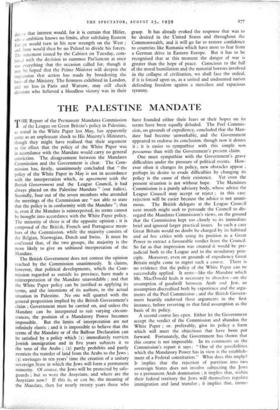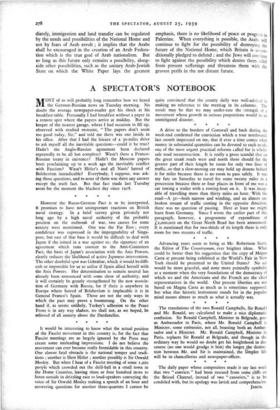THE PALESTINE MANDATE
THE Report of the Permanent Mandates Commission of the League on Great Britain's policy in Palestine, as stated in the White Paper last May, has apparently come as an unpleasant shock to His Majesty's Ministers, though they might have realised that their argument to the effect that the policy of the White Paper was in accordance with the Mandate would carry no general conviction. The disagreement between the Mandates Commission and the Government is clear. The Com- mission has, firstly, unanimously concluded that " the policy of the White Paper in May is not in accordance with the interpretation which, in agreement with the British Government and the League Council, it had always placed on the Palestine Mandate " (our italics). Secondly, four out of the seven members who attended the meetings of the Commission are " not able to state that the policy is in conformity with the Mandate "; that is, even if the Mandate is reinterpreted, its terms cannot be brought into accordance with the White Paper policy. The minority of three is of the opposite opinion ; it is composed of the British, French and Portuguese mem- bers of the Commission, while the majority consists of the Belgian, Norwegian, Dutch and Swiss. It must be confessed that, of the two groups, the majority is the more likely to give an unbiased interpretation of the Mandate.
The British Government does not contest the opinion reached by the Commission unanimously. It claims, however, that political developments, which the Com- mission regarded as outside its province, have made a reinterpretation of the Mandate unavoidable ; and that the White Paper policy can be justified as applying its terms, and the intentions of its authors, to the actual situation in Palestine. No one will quarrel with the general proposition implied by the British Government's claim ; Government must be carried on, and unless the Mandate can be interpreted to suit varying circum- stances, the position of a Mandatory Power becomes impossible. But the limits of interpretation are not infinitely elastic ; and it is impossible to believe that the terms of the Mandate or of the Balfour Declaration can be satisfied by a policy which (r) immediately restricts Jewish immigration and in five years subjects it to the veto pf the Arabs ; (2) partly prohibits and partly restricts the transfer of land from the Arabs to the Jews ; (3) envisages in ten years' time the creation of a unitary sovereign State in which the Jews will form a permanent minority. Of course, the Jews will be protected by safe- guards ; but so were the Assyrians, and where are the Assyrians now? If this is, or can be, the meaning of the Mandate, then for nearly twenty years those who have founded either their fears or their hopes on its terms have been equally deluded. The Peel Commis- sion, on grounds of expediency, concluded that the Man- date had become unworkable, and the Government appeared to endorse its conclusion, though now it denies it ; it is easier to sympathise with this simple non possumus than with the Government's present claim.
One must sympathise with the Government's grave difficulties under the pressure of political events. How- ever often it changes its policy, new obstacles appear ; perhaps its desire to evade difficulties by changing its policy is the cause of their existence. Yet even the present situation is not without hope. The Mandates Commission is a purely advisory body, whose advice the League Council may accept or reject ; in this case rejection will be easier because the advice is not unani- mous. The British delegate at the League Council next month might seek to persuade the Council to dis- regard the Mandates Commission's views, on the ground that the Commission kept too closely to its immediate brief and ignored larger practical issues. In such a case Great Britain would no doubt be charged by its habitual and ad hoc critics with using its position as a Great Power to extract a favourable verdict from the Council. So far as that impression was created it would be pre- judicial both to the League and to the mandatory prin- ciple. Moreover, even on grounds of expediency Great Britain might come to regret such a course. There is no evidence that the policy of the White Paper can be successfully applied. It rests—like the Mandate which Mr. MacDonald finds it necessary to abandon—on the assumption of goodwill between Arab and Jew, an assumption discredited both by experience and the argu- ments of the Peel Commission ; and the British Govern- ment heartily endorsed these arguments in the first instance, before reverting to that fatal assumption as the basis of its policy.
A second course lies open. Either let the Government accept the verdict of the Commission and abandon the White Paper ; or, preferably, give its policy a form which will meet the objections that have been put forward. Fortunately, the Government has shown that this course is not impossible. In its comments on the Commission's report it says : " One of the possibilities which the Mandatory Power has in view is the establish- ment of a Federal constitution." What does this imply? It implies that the rejection of partition into two sovereign States does not involve subjecting the Jews to a permanent Arab domination ; it implies that, within their federal territory the Jews will themselves regulate immigration and land transfer ; it implies that, imme- diately, immigration and land transfer can be regulated by the needs and possibilities of the National Home and not by fears of Arab revolt ; it implies that the Arabs shall be encouraged in the creation of an Arab Federa- tion which is the true goal of Arab nationalism. But so long as this future only remains a possibility, along- side other possibilities, such as the unitary Arab-Jewish State on which the White Paper lays the greatest emphasis, there is no likelihood of peace or progress in Palestine. When everything is possible, the Arabs will continue to fight for the possibility of destroying the future of the National Home, which Britain is uncon- ditionally pledged to defend ; and the Jews will con'inue to fight against the possibility which denies them relief from present sufferings and threatens them with the gravest perils in the not distant future.









































 Previous page
Previous page